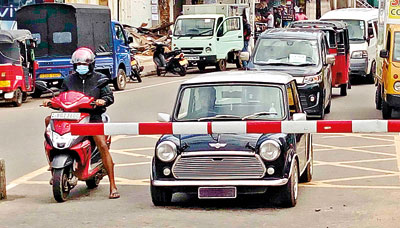Motor vehicle export and registration issues
The export of vehicles over 50 years old were banned in Sri Lanka. There is also a law that bans the import of vehicles over three years old, into the country.
The State Minister for Transport has announced that the ban on the export of old cars has been lifted and classic and vintage motor vehicles can now be exported from Sri Lanka.

File picture of a Mini Moke car
Sri Lanka has already lost many iconic vehicles that were in the country and formed part of our heritage. Hence, if the Minister is allowing the ban on export of valuable classic cars to be lifted, should there not also be a mechanism to allow the import of classic cars?
The price of classic cars in Sri Lanka are at least twice that of the international norm. Thus, the Minister’s policy is unlikely to be successful. What could also happen is that cars can get exported, and the registration number of these cars are not cancelled and replacement cars are smuggled into the country and take on the documents of the exported car. There are many known examples of this in the market.
Below is a suggested policy to avert this potentiality and to allow limited classic and vintage vehicles to be imported into the country:
1. Allow the export of vehicles
2. For the vehicles exported, allow those license plates to be digitally auctioned, and allow the new owner of that plate to import the same make and model of vehicle into Sri Lanka. The government can set floor prices for the auction of these plates.
3. Similarly, the RMV can advertise all the vehicle registration numbers that do not have up-to-date revenue licenses, and owners given six months to bring their documentation -up-to-date.
4. The numbers with no valid revenue license can then be digitally auctioned and the new holder of registration can import the same make/model of car. At the point of import, the old license can be cancelled and a new one issued.
5. A further 20 licences to import classic cars can be issued annually based on a digital auction with a floor price of Rs. 10 million.
Registration of illegally
imported vehicles
Another problem facing the Minister of Transport is the illegal import of motor vehicles, in the form of parts or entire vehicles. These vehicles take on the registration of existing vehicles that are off the road. The above policy of deregistration and cancellation of registration numbers that are not in use would close this loophole as well.
A significant number of vehicles have come into the country illegitimately, and are running on our roads with somewhat ‘doggy’ documentation. The government could declare an amnesty on these vehicles and request the owners to surrender the vehicles, pay a penalty and have them legitimately registered.
Once the amnesty is ended, the RMV can check the authenticity of vehicles coming in for revenue license renewal and flag any vehicles where there seem to be issues, and call these vehicles for a physical examination. For example, if a date of first registration of a vehicle precedes the date of manufacture of the vehicle, when the Vehicle Identification Number is entered into the system, this vehicle could be called for inspection and scrutinized. Basic Artificial Intelligence (AI) could also be used to flag vehicles with potential issues.
Finally, the two biggest loopholes in the system of vehicle registration is that the registration database can be retrospectively changed. This is how most illegitimately imported vehicles spawn pseudo legitimacy. A second contributory factor may be that ‘special numbers’ are issued three series ahead of the running series. This leaves gaps in the serialization of registration numbers. Again, a simple solution would be to abolish the system of ‘special numbers’ and allow for a significant sum of money, a vehicle owner to have personalized number plates. This could be a means of collecting additional registration revenue.
(The writer is Co-Founder of Innosolve Lanka (Pvt.) Ltd, a start-up dedicated to introducing sustainable mobility solutions in Sri Lanka)


